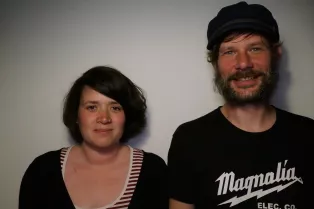Alison Thomas - Concrete Code Creations
Blog post #1
Describe the idea (Maximum 75 words)
As a part of the digital development in Swedish primary schools, programming is to be integrated into the curriculum. Currently, programming has been integrated into maths and technical subjects, but many teachers are not educated in programming. We believe that this perception of programming is limited and are developing a concept for creative programming workshops in school environments in order to reach all pupils, including those who are stronger in aesthetic subjects than maths.
Who are you?
We are Alison and Linus. Alison is a freelance sound technician and student of interaction design at MAU and Linus is a teacher for music, social studies and geography and has worked in Swedish schools for 10 years. Together, we combine our knowledge of programming, music and teaching in order to create workshops in primary schools that will help pupils, teachers and managing directors of schools to reach the goals set in the curriculum.
What will you do during these three months? How will you spend the time?
During the summer, we will perform explorative workshops to define the content, structure, length and target age group of our workshops as well as strategies for carrying out workshops for both pupils and teachers. We will conduct quantitative research with the pupils regarding their prior and current experience and qualitative research with the teachers regarding their perception of their own ability to teach programming. This research might aid us in developing service requirements.
What do you expect to achieve during Leapfrogs?
We expect to develop a realistic workshop concept for the age group we choose, including visual, digital and physical materials, and an assessment form that will allow teachers to easily assess their pupils regarding curriculum goals. Additionally, we expect to get in contact with the City of Malmö and Skapande Skola and to have taken steps towards becoming a part of Skapande Skola’s network so that schools can apply for state funds to book us.
Blog post #2
Tell us what you have done on your project so far during the Leapfrogs time.
During our Leapfrogs time, we have planned and executed testworkshops in order to find the right teaching concept and materials for pupils in 7th to 9th grade. We even conducted qualitative interviews with teachers and quantitative surveys with pupils to determine the teachers’ need for support in making sure that programming is taught in their regular subjects without having a deeper education in programming. We have worked on evaluating our insights from the workshops and interviews and developed our own complementary teaching materials such as code examples and info material.
Has everything gone according to the plan? Has anything unexpected occurred? Has something been easier/harder than expected?
We had difficulties finding a coding solution for the schools’ chromebooks. During the evaluation of our testworkshop, we found that we want to work with worshops but even play a part in teachers’ education. The teachers we interviewed felt that they had very deep knowledge in their subjects, but the few complementary courses they were offered in programming were not sufficient for them to feel confident in teaching programming. So, we l received confirmation of our idea and reasons why the current system is flawed, thus gaining legitimation for our idea.
What will you focus on during the remaining time? Will you follow your original plan or has anything changed along the way?
With the gained knowledge and insights, we will follow our original plan with legitimate reasons to present to institutions, schools and organisations. During the remaining Leapfrogs time, we will further develop our concept and the teaching materials and lay a ground for teaching instructions for teachers. And we will try to negotiate access to an online coding platform plugin for chromebooks that normally needs to be paid per pupil or per school.
Blog post #3
How did you experience the three months?
The three months flew by, giving us the possibility to learn a lot and test our idea hands-on, reflecting and adjusting our course in the process. We gained insights from teachers and pupils concerning school structures, appropriate approaches to teaching workshops and adapting to schools’ and teachers’ conditions.
What has been most difficult and what has been most enjoyable?
The most enjoyable aspect was going into schools to test our workshop prototype and realising that our approach works and that there is a need for change in the current system. Currently, teachers who do not have any programming experience or very little are supposed to integrate the topic into their lessons and they feel that their depth of knowledge is not sufficient.
The most difficult aspect was actually daring to start and contact schools.
Will you continue working on your project in the future? If so, what is your next step?
We will continue working on our project and our next step is to contact Skapande Skola and apply to become a part of their repertoire where schools can choose to book us and receive state funding. At the same time, we are contacting other organisations to become a part of in order to gain legitimacy.
What would you say is the most important lesson learnt while working on your project?
We learned that we did not need to have all the formalities in place before reaching out to schools. We found that conducting test workshops gave us the possibility to gain insights that we would not have gained that easily without testing our idea.
Do you have any tips to other new entrepreneurs?
Our tips are to not get caught up in all the formalities you think you need to have in place - website, business plan, an actual founded business - but instead find a way of testing your idea on a small scale in the field and developing those tests to increase the scale steadily.


